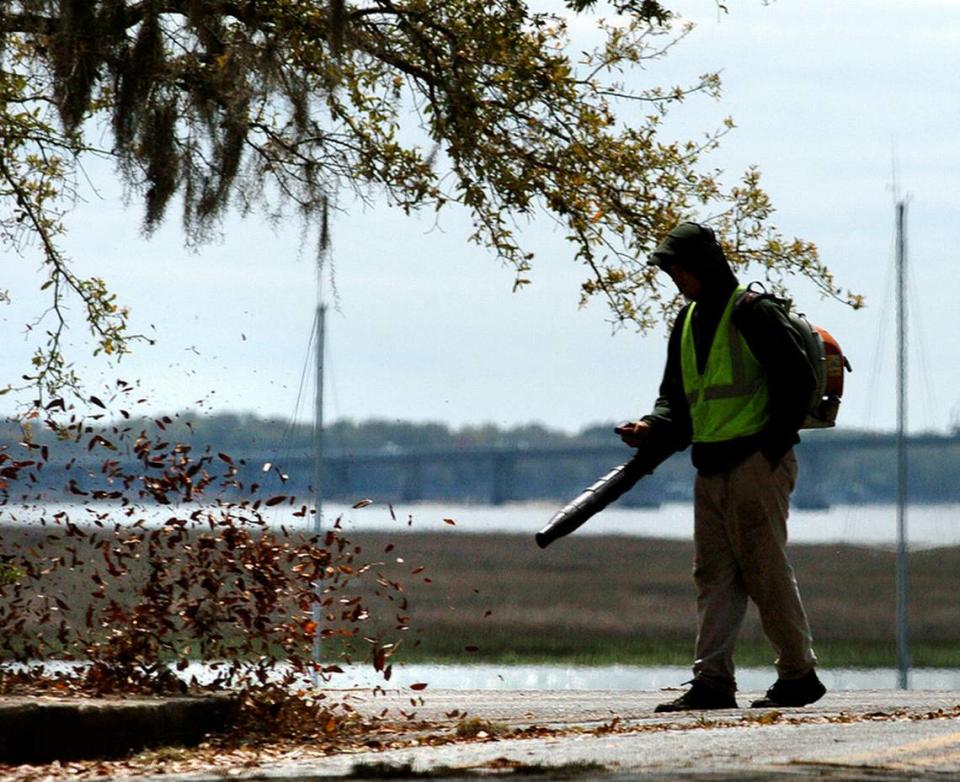Gas-powered leaf blowers are a LOUD, polluting fall scourge. Here’s an idea: Ban them.
Of all the world’s intolerable noises, none can match the shriek of a gas-powered leaf blower — the unholy contraption that interrupts autumn with its daylong caterwaul.
Even from two blocks away, this torture-chamber machine creates a ruckus so shrill, so persistent, so sonically offensive that I’ve considered taking to the roof with a catapult full of horse manure and launching it at the neighbor with the neatest lawn.
The scourge has only grown worse post-pandemic, with so many former commuters working at home and discovering what their neighborhoods sound like during the day. Leaf-blowers are the angry car horns of the Zoom generation.
Which is why Raleigh should ban them — at least the gas-driven kind.
“I’d like to dynamite them,” said my neighbor on Bloodworth Street. “But that wouldn’t be politically correct.”

Before we go any further, understand that nobody in City Hall is considering this ban, nor do I seriously expect that they will. Raleigh outlawed garbage disposals way back in 2008, and that eco-driven law lasted only a month — thanks at least partially to outrage from the Big Disposal lobby.
Raleigh already has noise regulations, but lawn-care equipment gets a specific exception. So you could report me for playing Beethoven’s 9th higher than 55 decibels, but I’m cool to rock a Ryobi until 11 p.m. — daytime hours, as defined by the city code.
But Washington, D.C., barred both the use and the sale of gas-powered blowers starting last year, and the noise-makers are either limited or banned in California, Vancouver and parts of Vermont, according to USA Today. Such talk is circulating in Denver.
The outrage over this archaic lawn tool goes far beyond afternoon naps spoiled by diligent landscaping.
Bad for air
Here’s the more globally conscious gripe: a two-stroke leaf-blower engine churns out more air pollution than a Ford Raptor — a three-ton pickup.
In a 2011 study, the car-review company Edmunds measured carbon monoxide and hydrocarbon emissions, and they concluded a half-hour’s yard work on an Echo two-stoke gas-powered leaf blower was equal to the Ford truck driving from North Texas to Alaska.
Bad for health
While we’re piling on, here’s another fault to consider: gas-powered leaf blowers cause serious health risks.
The nonprofit Respiratory Health Association in Chicago points to their engines creating chemicals and particulate pollution that lead to asthma, cardiovascular disease and COPD — even after short-term exposure.
Even if the engines were burning clean, they whip enough dirt, leaves and mold to aggravate all of the above ailments, not to mention allergies.
I’d rant even further about leaf blowers destroying critter habitat and natural fertilizer, but I’m confining this harangue to gas-powered models.
All I’m really asking is for a switch to electric leaf-blowing models, which are both quieter and cleaner.
I own one myself. I am not in the pocket of Big Rake.
Of course, the cost
I’m sure an avalanche of economic impact anger is heading my way, particularly from landscaping companies that employ large crews of workers toting the gas-powered leaf blowers I propose to ban.
I understand. But should Raleigh carry on with on a practice with obvious harms involved, and decline to push for any kind of improvements, noise and pollution be damned, because it provides jobs?
You tell me. (Ducking.)
In San Mateo, Calif., homeowners can get a 50% rebate on electric leaf blowers with payback up to $100. Commercial landscapers can get 75%, maxing out at $500. How long before that upfront expense pays off in gas savings?
Again, you tell me. But it’s not impossible.
Personally, I think we’ve got an unhealthy obsession with lawn care. I’ve got neighbors with a weekly landscaping contract, and the blower patrol shows up even with three leaves on the ground. They’re going at it as we speak, and I count maybe a dozen leaves underneath my eight backyard hardwoods.
Let them pile up a little. And if you really feel the need to whisk that pile into the street, take a flying leap in it instead.

